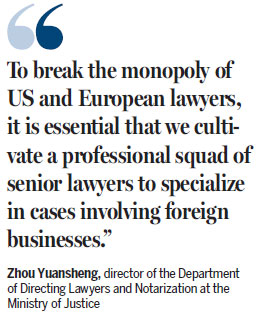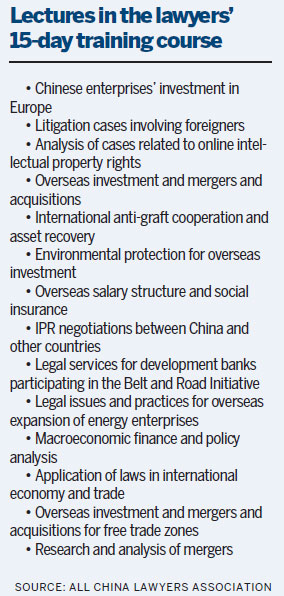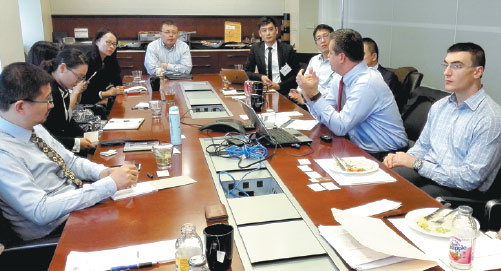Courting an international profile
China's legal profession is promoting training programs to provide the nation's legal eagles with the skills required to succeed in cases around the globe, challenging the dominance of foreign experts. Zhang Yan reports.
China's rapid economic development and growing role on the international stage have seen many businesses, including a large number of State-owned companies, expanding overseas and engaging in multinational mergers and acquisitions against a backdrop of growing global economic integration.
On the upside, the companies have grown richer and their global footprints have expanded, but the downside is that the number of international lawsuits concerning Chinese businesses has risen greatly. The growth in transnational legal cases is proving problematic. Few Chinese lawyers have deep experience of conducting cases related to international law, which means foreign practitioners are engaged to act on behalf of domestic companies in about 80 percent of the lawsuits.
According to a survey conducted by the Ministry of Justice last year, the process of "going global" has seen Chinese companies engaged in legal disputes related to trade protectionism and barriers. Many also have faced allegations of "dumping" products in overseas markets - selling goods at prices lower than local norms - and the unethical use of State subsidies.
Statistics provided by the ministry show that in the last five years, Chinese companies have been involved in 328 cases of this type, the highest number for any country, concerning goods and services worth a combined $53.4 billion.
When faced with cross-border disputes, most Chinese enterprises "hire foreign lawyers because of their good international reputations and international resources. That not only limits the influence of Chinese lawyers in international affairs, but even threatens national economic safety", said Zhou Yuansheng, director of the Department of Directing Lawyers and Notarization at the Ministry of Justice.
"To break the monopoly of US and European lawyers, it is essential that we cultivate a professional squad of senior lawyers to specialize in cases involving foreign businesses," he said.
Core national interests
According to Zhao Dacheng, China's vice-minister of justice, the cultivation of legal talent is closely related to core national interests and the country's economic development strategy. However, in recent years, the training of lawyers has "lagged far behind the practical needs required for social and economic development".
The lawyers' participation in international affairs and their influence in the global market for legal services have not adapted in line with the country's economic development goals, he said.
Wang Junfeng, director of the All China Lawyers Association, said that by the end of next year, a training program that started in 2013 will have prepared at least 300 lawyers from 100 law firms to conduct cross-border lawsuits, expanding their presence in a field currently dominated by foreign competition.
Of those, 120 will handle overseas investments, multinational mergers and acquisitions, as well as international finance and securities.
Moreover, 150 of the lawyers will be conversant with laws and regulations relating to the World Trade Organization, antidumping and antitrust issues, and the protection of intellectual property rights, while a further 30 will have received training in laws relating to energy and resources, such as maritime and space interests.
"In the past, some Chinese enterprises hired foreign lawyers to represent them in international legal cases, which not only cost a huge amount of money, but, because they were given access to core business secrets, also posed a serious risk to national economic security," Wang said, adding that even with the use of foreign legal talent, Chinese companies do not necessarily prevail in the courts.
In September 2012, H.C. Starck GmbH - a Germany company that produces specialty metals, advanced ceramics and chemicals for the nuclear and aerospace industries - sued Ningxia Orient Tantalum Industry Co in the United States Eastern Federal Court in Philadelphia, alleging that the Chinese company had infringed its patents in the US.
Starck demanded that Ningxia Orient Tantalum - a major State-owned enterprise - immediately cease to infringe its patents. It also demanded a large sum in compensation.
In response, Ningxia Orient Tantalum hired lawyers from a firm in Los Angeles. The move didn't pay off because the language barrier and cultural differences resulted in the lawyers making little headway. Despite its failure to proceed with the case, the firm still charged more than 3 million yuan ($463,000) for six months work.
"Even worse, the firm had a prejudicial attitude towards the Chinese company and mistakenly believed it to be guilty of infringement. The US lawyers were reluctant to push forward valuable ideas, and they failed to notify their client about court hearings until the court released the information on its official website," said Wang Zhengzhi, a senior partner at the Globe-Law legal firm in Beijing.
In March 2013, Ningxia Orient Tantalum decided to employ Wang Zhengzhi - who specializes in intellectual property rights and patent protection - to settle the case, and brought in another US law firm, Morgan, Lewis & Bockius, based in Philadelphia, to assist him.
"The priority for Chinese lawyers is to become more familiar with domestic companies and the related management laws and processes, so they will be better equipped to defend the companies' rights," he said.
Between April 2013 and October last year, Wang Zhengzhi and his team were in regular contact with Ningxia Orient Tantalum's executives and research staff, and were given access to restricted documents related to the company's core business, including research and development technology, consumption data and networks.
"When Chinese lawyers serve as 'project managers', they must be able to grasp the overall situation so they can formulate a litigation strategy. They must also supervise lawyers from overseas to ensure that they are able to assist their Chinese counterparts when writing legal documents or attending court hearings overseas," he said.
"During several rounds of negotiations and material analysis, we identified the key issues and provided solid evidence to prove that our client's technology had a totally different research channel from Starck's, therefore the company's products didn't infringe Starck's patents at all," he said.
Faced with the new evidence, Starck withdrew its lawsuit in December last year, and signed a settlement agreement with Ningxia Orient Tantalum.
"My team only charged the company about 1 million yuan during the whole legal process, which just underlines the advantages that come from employing Chinese lawyers," Wang Zhengzhi added.
Plugging the gap
According to the lawyers association, more than 270,000 lawyers work in China's 20,000 law firms, but only 30,000 of them specialize in international law.
Zhou, from the Ministry of Justice, said the Ministry of Finance and the Ministry of Justice have acted to plug the gap by investing 4 million yuan every year since 2013 to support the ACLA's training programs.
In addition, local lawyers' associations have established a database of promising lawyers to evaluate their educational backgrounds, work performance, practical experience, professional training and proficiency in English, he said.
"The best are invited to attend special two-week practical training courses offered by the ministry. A select number are then selected to work in institutions and large legal firms in the US and Europe to deepen their knowledge of international law and improve their communication skills," he added.
In August last year, the association held its second annual training session, during which 102 lawyers undertook a 15-day course in Beijing, focusing on case studies and simulated court sessions.
After the course, the trainees took a number of exams, which led to 30 of them being chosen to attend law colleges overseas or to work at large legal firms in Europe, he said.
"I gained a great deal of experience during the training," said Yang Chen, a senior lawyer at the Beijing Jincheng Tongda law firm who was selected for a six-week stint with law firms in Spain and Belgium.
"The priority is to gain more practical experience, learn how to manage legal risks and improve training programs and the quality of our services," he said.
Zhou, of the All China Lawyers Association, said opportunities such as these will promote the development of the domestic legal sector and improve lawyers' abilities to undertake cross-border litigation.
Ariel Ye, an international law specialist at the Beijing office of the global law firm King and Wood Mallesons, said the initiative will help to strengthen Chinese lawyers' abilities and challenge the dominance currently enjoyed by foreign lawyers.
"But we should also understand our own shortcomings," she said. "We must emphasize training for talented professionals and encourage them to actively participate in international forums, to enable them to communicate and share their experiences with foreign competitors, and to improve their practical abilities."
According to Wang Junfeng of the All China Lawyers Association, greater government participation will be essential if the sector is to make a mark internationally.
"The key is to draw the attention of the central authorities, and ask them to be more aware of the important role that lawyers play. But we should also gain more experience and improve our business standards and levels of proficiency so we can narrow the gap with our competitors from the US and Europe," he said.
Contact the writer at zhangyan1@chinadaily.com.cn


|
Chinese lawyers visit Morgan, Lewis & Bockius, a law firm in Philadelphia, in November. The exchange with US counterparts was part of a program to train more domestic lawyers to deal with cross-border lawsuits. Provided to China Daily |
|
Ma Xuejing / China Daily
|









